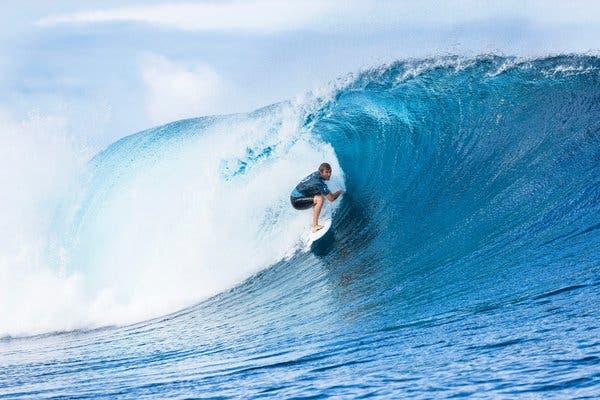Advertisement
current events
In this lesson, students will learn about Teahupo’o, home to some of the world’s most dangerous waves, and explore ethical questions around surfing.

Find all our Lessons of the Day here.
Featured Article: “For Paris Olympics, Surfing Will Head to Tahiti’s ‘Wall of Skulls’” by Victor Mather and Talya Minsberg
The 2020 Sumer Olympics in Tokyo are just around the corner. But Paris, which is hosting the 2024 Summer Games, is already making plans for its surfing competition. Instead of to the coast of France, surfers in 2024 will travel to Teahupo’o, Tahiti, an overseas collective of France that is home to some of the world’s most dangerous waves.
In this lesson, you’ll learn what makes this location a draw for some of the best surfers in the world. Then you’ll explore ethical questions related to surfing.
Watch this video compilation of surfers in Teahupo’o, Tahiti. Then respond to the questions below:
-
What do you notice about the conditions at Teahupo’o and the type of surfing that is done there?
-
What is your reaction to what you see?
-
Teahupo’o roughly translates to “wall of skulls.” Why do you think it’s named that? What did you see in the video that makes you say that?
Read the article, then answer the following questions:
1. Why is the surf competition for the 2024 Olympics in Paris taking place in Teahupo’o, Tahiti, instead of in France?
2. What unique characteristics make Teahupo’o a desirable location for a world-class surf competition?
3. Compare the surfing in Tahiti to that of Shidashita Beach in Japan, where the contest will take place for this summer’s Tokyo Games. Why does Keala Kennelly say spectators “are going to question whether it’s the same sport”?
4. Media literacy. Watch the two videos from Teahupo’o embedded in this article. How do they add to your understanding of the article? Why do you think the editors included them?
5. What are the advantages and disadvantages of using a wave machine for the Olympic Games? Do you think this technology is a good option? Why or why not?
6. Why does Kennelly think she would be “the person to beat” if she were to compete at Teahupo’o? Do you think she would have a good chance?
This article raises some questions about ethics involved in surfing. Write a list of ethical questions of your own about the sport. These might be related to the dangers associated with surfing, the use of technology, gender parity or anything else mentioned in the article.
Remember, ethical questions often ask us what the “right” thing to do is, based on our ideas about morals, responsibilities, rights and values.
For example, in our Student Opinion feature, The Learning Network has asked questions like whether it is selfish to pursue risky sports, if technology should be limited in sports and if sports should be coed.
If you want to explore beyond the article, you can come up with questions based on your own experience of surfing or on articles from the Times Topics Surfing page.
If you have more time …
Choose one of the questions you came up with and respond to it. What do you think is the right thing to do? Draw on evidence from the article, your own experience or other sources to support your response.






Recent Comments